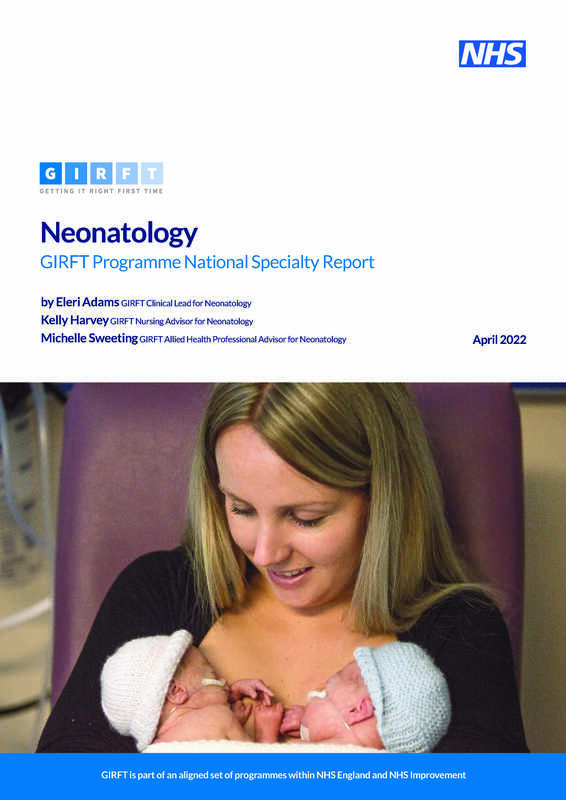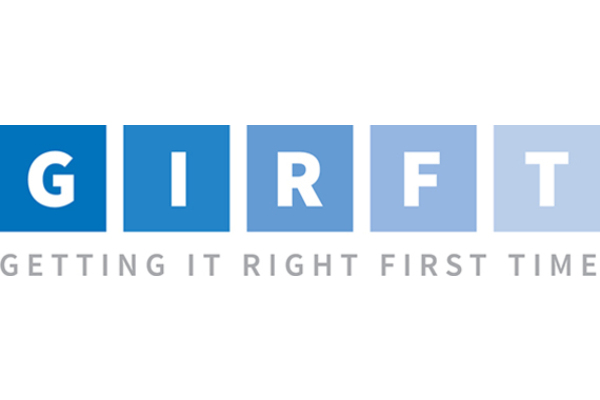
A new data-driven national report into neonatal services across England outlines measures which can improve services for babies, their families and the NHS staff who care for them.
GIRFT’s national report for neonatology is now available for NHS teams to download here. It is supplemented by a separate report outlining and addressing workforce challenges for the specialty, available here.
The report is written by BAPM President Elect Dr Eleri Adams (consultant neonatologist at the Oxford University Hospitals NHS Foundation Trust), along with nursing adviser Kelly Harvey (North West Neonatal Network) and AHP adviser Michelle Sweeting (speech and language therapist at Mid and South Essex NHS Foundation Trust). It is based on in-depth data and deep dive discussions with staff in many of the 156 neonatal units in England, including neonatal intensive care units (NICUs), local neonatal units (LNUs), and special care units (SCUs).
The overarching aim of the report is to ensure the 55,000 babies cared for by neonatology teams in England every year, and their families, receive the best possible care around the time of birth and in the first few weeks of life.
Building on NHS England’s Neonatal Critical Care Transformation Review (NCCR) of 2019, the report focuses on the following key areas to improve outcomes and experiences for babies and their families:
Organising services to ensure the right care is given in the right place
The report emphasises the importance of making the best use of networked perinatal pathways, and highlights a need for more intensive care cots in NICUs, reconfiguration of neonatal services and improvements in specialist neonatal transport provision.
Improving clinical care
Clinical areas for improvement focus predominantly on premature babies, as half of all neonatal deaths occur in infants born at less than 28 weeks (with wide regional variation from 9.5%-21%).
Recommendations include:
- Providing the best start to life: Delivery in a NICU, early thermal care, optimal cord management, and the administration of antenatal steroids, antibiotics and magnesium sulphate all impact on the outcomes of premature babies. GIRFT advocates for improvements in delivery of these metrics through nationally-supported quality improvement programmes.
- Optimising respiratory care: Standards state that preterm babies who need respiratory support soon after birth should, where possible, receive continuous positive airway pressure (CPAP), rather than invasive ventilation. There is wide variation across networks and trusts in the percentage of babies intubated and ventilated in delivery suite (53-96% for babies <27 weeks, 19-56% at 27-30 weeks). GIRFT recommends the development of guidance for preterm infant respiratory support in the delivery suite to reduce the need for ventilation and the likelihood of developing chronic lung disease of prematurity.
- Improving access to breast milk: There is wide variation in the percentage of babies who receive their mother’s breast milk on the day they are born (from 29-58% across ODNs), and donor milk is not routinely available in all units. GIRFT recommends measures which can improve early access to breast milk, helping to protect against conditions such as necrotising enterocolitis (NEC), reduce rates of sepsis, improve neurodevelopmental outcomes, and develop a close relationship between mother and baby.
The report also highlights opportunities to improve patient safety, through drug safety measures and pulse oximetry screening (which improves early detection of congenital heart disease, infection and serious lung conditions).
Ensuring a better family experience
Throughout the report there is an emphasis on the importance of family involvement in supporting their baby’s neonatal care, resulting in better neurodevelopmental outcomes for the baby, increased weight gain, and a shorter length of time in hospital, as well less parental stress and anxiety. The recommendations include:
- Better access to facilities which allow parents to remain with their baby: The GIRFT review noted variation between units in access to transitional care services, parent accommodation, food and drink facilities, bereavement facilities and financial support. The report recognises that allowing parents access to their babies at all times will mean significant practical and cultural changes to services, ensuring support and education is available for all staff and families, and investment in facilities to support families while they are involved in their baby’s care.
- Improved psychological support for families: Mothers whose babies are admitted to neonatal units are shown to have significantly higher rates of perinatal mental health difficulties. However, currently only half of NICUs and very few LNUs and SCUs have a regular psychology service. GIRFT outlines a series of recommendations and actions to ensure mother-baby separation is reduced and to improve psychological support for all families.
Building and supporting the neonatology workforce
A supplementary GIRFT neonatology workforce report offers a detailed outline of the current position regarding workforce, highlighting shortages in medical and nurse staffing, as well as allied health professional (AHP) and psychology input. For example, GIRFT identifies that there are 2,000 whole time equivalent (WTE) nursing vacancies in neonatology in England, with 25% of nursing workforce aged 50 and over, and around 12,000 shifts in 2018/19 covered by external agency nurses. Less than half of neonatal services have regular AHP services such as dietetics, physiotherapy, speech and language therapy and occupational therapy.
Additional funding in the NHS Long Term Plan, particularly for neonatal nurse staffing, is welcomed, as is funding for AHPs and psychology support at a regional level, although funding at a local level remains challenging. Actions in the report include the consideration of new roles, the introduction of new recruitment strategies, and improvements to education, training and career development across all staff groups.
Dr Adams said: “It was a privilege to undertake the GIRFT deep dive visits, to understand and share local and regional experiences. We hope that the actions and recommendations contained in these two reports report, as well as the data we have supplied to trusts, will prove useful to support ongoing improvements in neonatal care and outcomes, as well as family and staff experiences over the next five years.”
GIRFT is hosting two webinars:
The findings and recommendations from the GIRFT neonatology national report - 7 July



